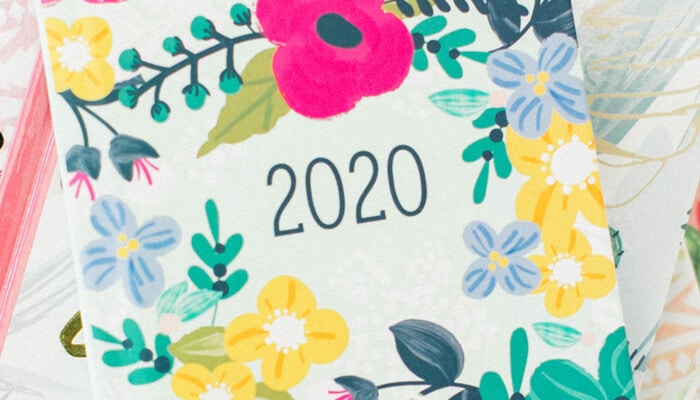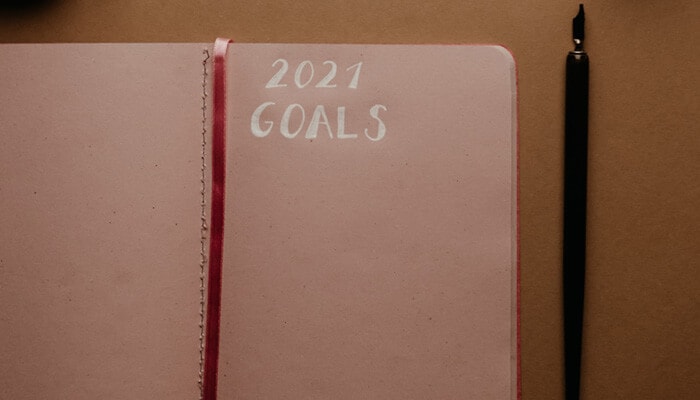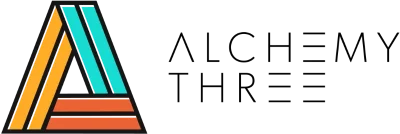Back in January 2020, none of us could have even imagined what would occur in the year to come. Unfortunately, much of what transpired forced many people to modify their dreams, goals, and plans into something unrecognizable — or to abandon them completely. If you were one of those people, and especially considering the uncertainty brought by COVID-19, it’s understandable to recoil at the thought of goal setting for 2021. Despite the unknowns we face in the near future, setting goals might actually be more essential now than ever before for maintaining productivity, motivation, hope, and sanity.
Now that we’ve acknowledged that our goals still matter (or maybe you aren’t convinced yet — and if that’s the case, just pretend for now), how do we actually go about setting these goals? Of course, if you’re a goal setting aficionado, you’re probably familiar with the idea of setting SMART goals (specific, measurable, attainable, realistic and timely), but how can we make meaningful and measurable goals if we have no clue where the new year is going to take us? To help with your goal setting endeavor, we’ve put together a series of blog posts to get the wheels turning and hopefully provide some much needed inspiration to keep on keeping on.

Before you begin
YearCompass, an organization that helps you self-reflect on the year and plan for the future, recommends taking at least three hours of uninterrupted time to look back and at least one hour of uninterrupted time to plan the year ahead. So set aside the time, turn your phone on “do not disturb”, and arrive for yourself. Create an atmosphere that allows you to focus and be mindful — put on some relaxing music, clear your desk of clutter, pour yourself a hot beverage, light a few candles, and whatever else you might need. Finally, let go of all of your expectations and judgemental thoughts; these will only hinder the reflection and planning process ahead.

Looking back to move forward
It can be difficult to move forward without taking a little time to look back. A good place to start is to reflect on the past year; to learn from our mistakes and let go of what we were unable to accomplish, but also to celebrate the victories (no matter how small!).
Whether you need to just sit and ruminate quietly, mindfully journal, or talk it out with a trusted friend or family member, take some time to reflect on 2020. Here’s a list of questions (by no means exhaustive) to get you started:
- What is the biggest lesson you’ve learned?
- A risk or opportunity you took (in your professional or personal life)?
- A meaningful change you’ve made (in your habits, your relationships, your mindset)?
- Something you discovered about yourself?
- What (or who) have you given time and energy to this year that you no longer have space for in your life?
- What are you most proud of accomplishing?
- What didn’t you achieve, or wish you could have achieved?
- What was the biggest challenge you faced?
- What do you have to be grateful for?

Summarize and celebrate your accomplishments!
We’ve made it through a really tough year, and whether you believe it or not, you deserve a celebratory “last lap”. 2020 has given you a right of passage into 2021; you’re heading into the new year with a certain resilience and adaptability that 2020 demanded of you. So, let’s celebrate all of the things we did achieve: a new hobby you discovered, a skill you learned, passion you indulged, or habit you redesigned and integrated into your new way of life. Celebrate the things that even a global pandemic couldn’t stop you from doing!
Recognize themes, patterns and potential opportunities
Joan Michelson, host of the acclaimed podcast Green Connections Radio, suggests to look for the connecting thread in all of your accomplishments across all aspects of your life (not including working from home and doing everything virtually, of course!). Michelson states that by starting with analyzing your accomplishments of 2020 will help start your 2021 goal setting from who you are today, given that the pandemic-economic and political upheaval of the past year has probably shifted something in you. What do your projects, passions and opportunities have in common, both personally and professionally? What excited, interested, and resonated with you the most? And which activities enabled you to work or spend time with people you enjoyed, taught, and supported you the most?
Identifying the themes and patterns of your actions (even between things that you think don’t have anything to do with one another!), and subsequent opportunities that came out of them, will help to inform your goals and priorities for the next year. You’ll have a better idea of how you can best show up for yourself, what boundaries you need to set or activities you need to prioritize, and relationships you want to nurture in order to maximize your success. We all have a unique worldview shaped by our own experiences and passions, and if you create your goals to be in line with that worldview, it’s likely your goals will be quite different from someone else’s!

Up next: Build specificity around your goals and work backwards
Set your 2021 goals starting with the “working backwards” approach. The idea is to start with your ultimate goal for next year and work your way backwards from there to develop a plan-of-action. Stay tuned for next week’s blog post!




